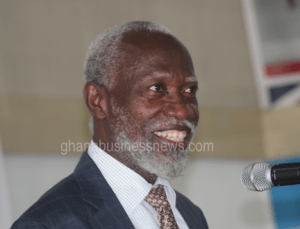Ghana at 100 must be a solidly developed country – Prof Adei

Professor Stephen Adei, a Development Economist and the Chairman of the National Development Planning Commission (NDPC) has envisaged that Ghana at hundred must be a solidly developed country, a “Better Ghana Beyond Aid”.
He proposed that there is the need for a long-term plan, which contained the main coordinates of what to do to realize the national vision of Ghana at hundred.
“I think that the “Ghana Beyond Aid” document and the draft 40-year long term plan provide the key elements to do that and the NDPC intends to work with the Presidency and Parliament to do exactly that by the end of 2019,” Prof Adei said in his presentation at the launch of the maiden National Development Forum in Accra.
The forum, which was formally opened by Mr Ken Ofori-Atta, the Finance Minister, was organized by the NDPC on the theme “Ghana@100: An Agenda Towards a Solidly Developed Nation”.
The National Development Forum will be a series of monthly forum to engage the public on development policy and promote ownership and accountability for the implementation of national priorities.
It will focus on topical national issues about the economy; social development; spatial planning; infrastructure development; environment; and governance.
Prof Adei, who painted a portrait of Ghana@100, that is, by 2057, said: “Ghana must be a solidly developed country. This should be the vision to which we must anchor our hopes, aspirations and efforts”.
He said this was something that the President had kicked off with his Ghana Beyond Aid Agenda.
He noted that periods when Ghana had seen better economic performance from pre-colonial days to date were also the periods during which the nation had clear vision and a transformational agenda, leadership commitment, consistency in implementation, relatively controlled corruption and when fiscal constraints were eased.
“I am referring to the era of Governor Gordon Guggisberg’s 10-year plan, pre-Republican Nkrumah era, Economic Recovery Programme of Rawlings, and Kufuor’s Poverty Reduction Programmes I and II,” Prof Adei stated.
“Today, we have Ghana Beyond Aid under President Nana Addo Dankwa Akufo-Addo and already at least on the economic front, we are seeing the same phenomenon playing out again.”
He said at the same time, Ghanaians need to learn from the factors that often interrupted the nation’s progress as a people and vow never to let them happen again and the sky would be the limit.
“Yes! We can be a first world country by 2057 when Ghana will be at hundred.”
Prof Adei said a long-term perspective plan must be simple, clear and capture the aspiration of the people in few pages, which all well-meaning Ghanaians could subscribe to and that was devoid of partisanship.
He said the long-term perspective framework had to be broken down into medium terms plans, whose stages include the foundation for take, structural transformation, accelerated growth and consolidation.
He said at each stage, efforts should be directed at achieving certain targets in line with the long-term framework.
He cited that the current programme, Medium-Term National development Policy Framework: An Agenda for Jobs: Creating Prosperity and Equal Opportunity for All (2017-2024) could be adapted and extended for eight more years to form the first stage towards Ghana@100 vision.
“Already we have seen an improved management of the economy, a clearer vision under the Ghana Beyond Aid agenda, the revival of the agriculture sector, a resource for infrastructure programme, the beginning of transformation of pre-university educational sector and the one-district, one-factory programme,” Prof Adei said.
He said for Ghana to attain the level of developed countries, there was the need to improve leadership attitude and for attitudinal change on the part of Ghanaians.
Prof Emerita Takyiwaa Manuh, Vice Chairperson, NPDC, who chaired the function, said that the 1992 Constitution of Ghana provided the legal basis for governments to envision a just, equitable and inclusive development, and heighten citizens’ expectations of the country.
She noted that successive governments had sought to pursue this goal by embarking on interventions within the medium term, that is, four years at a time.
Source: GNA
